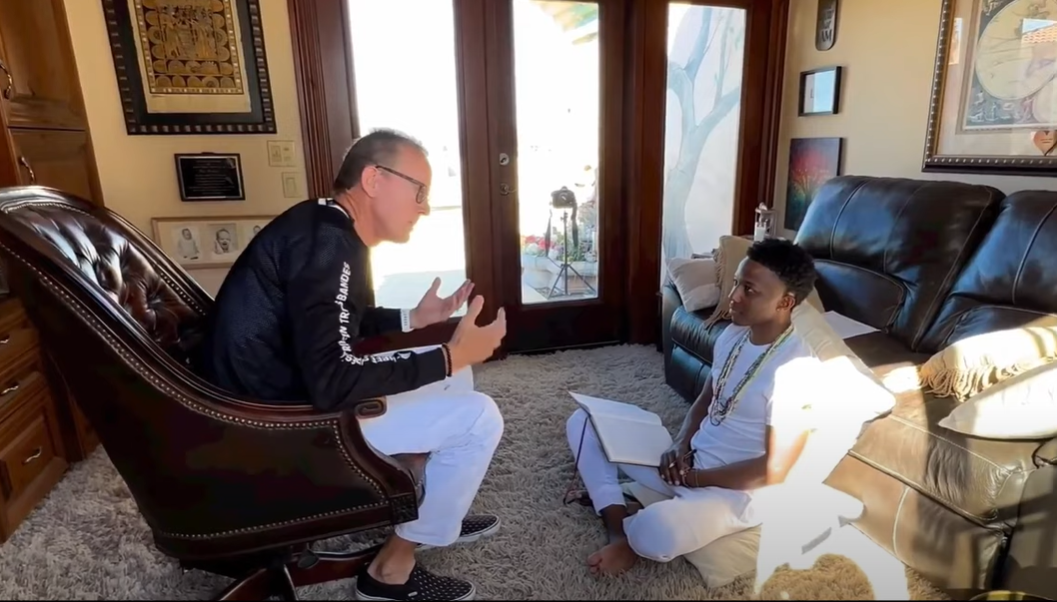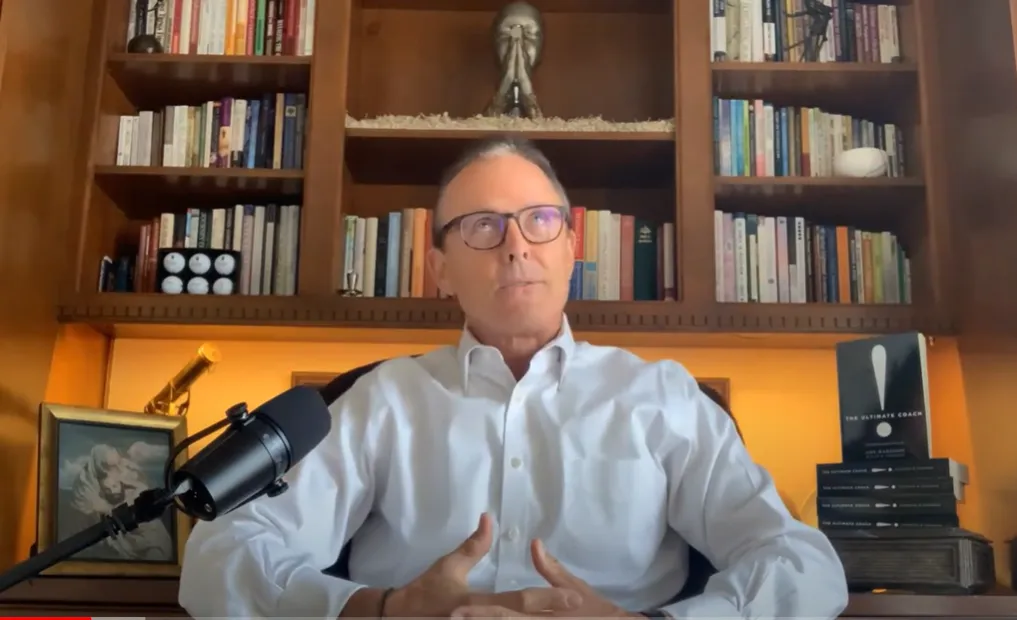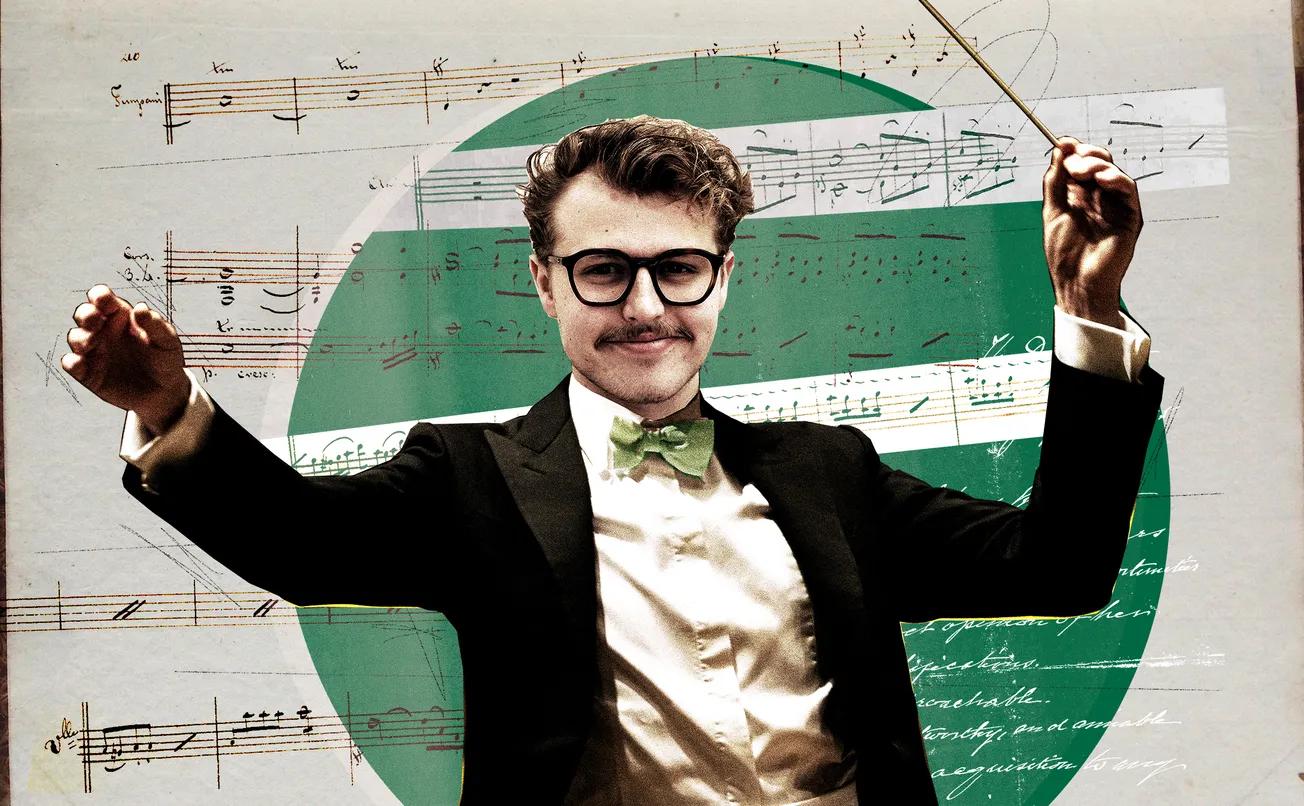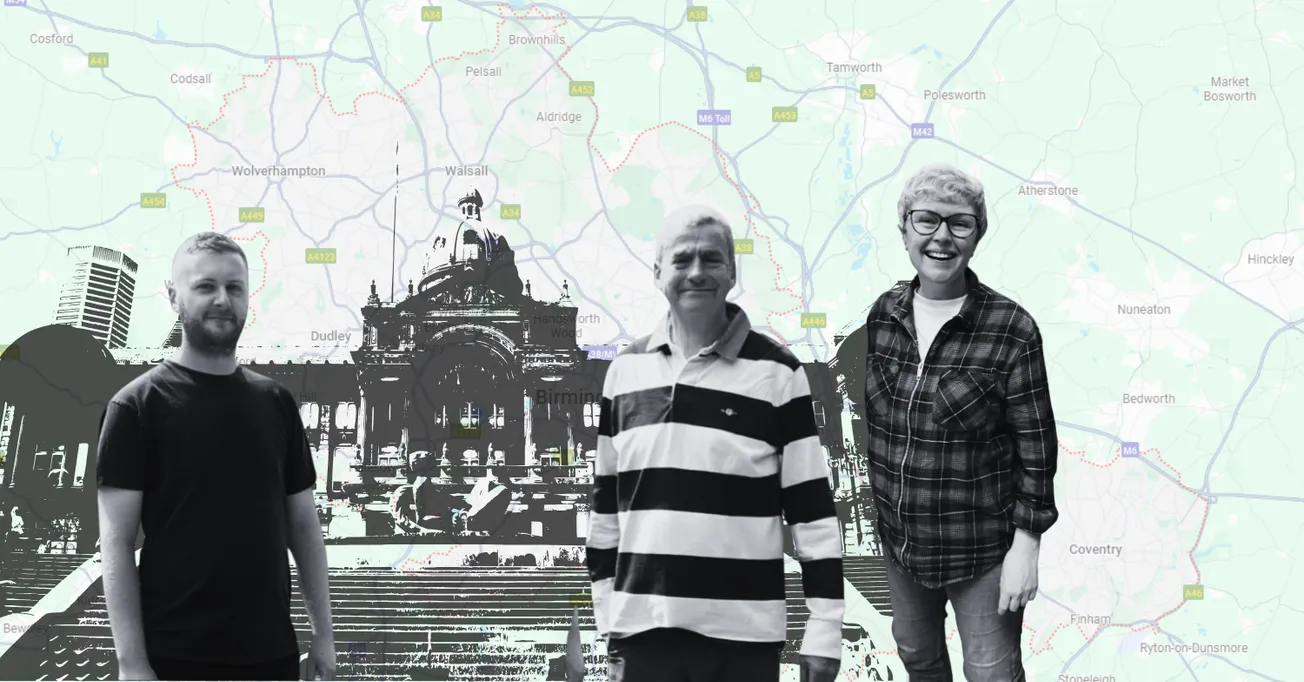“Firstly,” the woman at the table says, “it’s not a cult.”
I’ll admit that this sentence doesn’t fill me with confidence, but the woman — a doctor, who I’d guess is in her 40s or 50s — is warm and friendly, and because I’ve arrived late to the event at Villa Park and I don’t know anyone else here, I’m willing to step outside of my comfort zone.
I’m here at ‘The Ultimate Experience — Birmingham!’ because of my fascination with ‘life coaching’, a growing part of the self-help culture that has spread like wildfire across social media platforms, particularly YouTube. I want to hear from inspirational speakers to see if changing my mindset really can change my life. I’m especially interested in the influence of one book in particular: The Ultimate Coach by Amy Hardison and Alan D. Thompson, which has given rise to four events (one each in Phoenix Arizona, London, Mumbai and now, Birmingham).
It’s when I explain this to the doctor that she assures me I haven’t stumbled upon a Manson Family-like community here. Indeed, the intentions behind this event seem far from sinister. The money raised from Ultimate Experience ticket sales is being donated to charities in each of the locations it’s taking place; in Birmingham, approximately £30,000 has been raised for Birmingham Children’s Hospital’s audiology team, where the daughter of one of the organisers has received life-changing cochlear implant surgery.
The broad tent of ‘wellbeing’ has gone through many shifts over time. Once considered a fringe interest — the sort of thing they’d joke about on The Simpsons — today, it’s a common thread that runs through much online video content. Recent years have seen digital diet trends focused on clean eating and channels dedicated to male self-improvement; now, life coaching — personalised, holistic guidance, driven by the tenet that a person has everything they need within them to create a successful life — is having a moment.
The practice has been popular in America for years but has recently become popular in the UK. So when I saw that a life coaching event was happening in Birmingham, of all places, I knew I had to go. The characteristic Brummie disposition is one of down-to-earthness — anathema to self-aggrandisement. I wondered if there was a large audience here for American-style, “Dream big! Believe in yourself!” optimism. That’s not to say Brummies don’t think much of ourselves, just that we don’t tend to shout it from the rooftops as much as, say, our friends in Manchester. But now I’m here, there don’t seem to be many Brummies in attendance. In fact, everyone I speak to is from another part of the country, or another country entirely. A friendly woman on my table, a life coach, has flown all the way from Canada. There are a lot of American voices in the room.

The conference suite we are in is filled with round tables in front of a low stage. In front of every seat is an abridged copy of the Ultimate Coach book — a new edition, meant for a teenage readership. Next to the stage is a large 3D sign adorned with bright white light bulbs that spell out the words “BE YOU”. On the bar at the back of the room, someone has placed boxes of tissues from Kleenex’s Wellness range, which as far as I can tell are just regular tissues with the words “thrive” and “cherish” on them. Several people milling about are wearing hoodies printed with motivational messages. One says: “Grab life”. Another: “Dear person behind me, the world is a better place with you in it.”
The rise of life coaching
Life coaching, in 2024, is big business. According to analysis by CoachRanks, a company that provides marketing strategy insights to coaches, the global market size is projected to reach $6.2 billion this year, up from $5.34bn in 2023. Most coaches operate in North America, closely followed by Western Europe. In the UK, there is a high demand for personalised coaching, with the health and wellness market poised for significant growth.
This is reflected in some of the speakers who appear at Villa Park and the conversations I have with attendees. My tablemate, the doctor, tells me she is keen to see the NHS adopt life coaching principles when interacting with patients. “If we tell someone they have a chronic illness and that means they won’t be able to do certain things, they will be defeatist,” she says. But, she tells me, if we refuse to let these self-limiting beliefs set in, patients will be empowered to live more fulfilling lives.
She thinks the approach can benefit healthcare workers too, explaining that several years ago, she was signed off work after dealing with bullying and low moods. I ask if she thinks the problems she experienced should be dealt with by the institution, rather than individuals. She concedes they should, but is still emphatic about the benefits the “ultimate” approach can bring to practising medicine, so much so she has recently been in touch with two American doctors who are already implementing the techniques in the States — they are two of the speakers listed on the bill today.

As the life coaching industry has grown, so has scrutiny of it. Three years ago the Guardian closely examined the business of the hugely successful Californian ‘queen’ of life coaching, Brooke Castillo. Would-be coaches were paying $18,000 for Castillo’s six-month programme, in the hope of setting up lucrative practices themselves, but many were left disappointed. When success eluded them, they were naturally told by their coaches that they were responsible for their own failures — their self-limiting mindset was to blame.
It’s not just Castillo. The BBC has reported that many people looking for, or to become, a life coach have been caught up in multi-level marketing scams, pyramid schemes and cults of personality. A big reason for this is that the life coaching industry is pretty much unchecked. The National Careers Service website states that: “Life coaching is not regulated in the UK, so anyone can work as a life coach if they feel they have the necessary skills and qualities.” That ‘anything goes’ landscape is reflected in the broad variety of professionals operating within it, from practitioners with a background in psychology, with counselling qualifications, to those who impart the knowledge they’ve gained from life experience.
I meet one such person at the event who, over lunch, tells me she has a background in the music industry. “I was an overworker and a perfectionist,” she says. She had chronic health issues including anxiety and turned her life around by completing Neuro-Linguistic Programming. Now she tries to help others. She started her life coaching business a year and a half ago and she thinks the industry will only get bigger because conditions in this country have gotten worse. It’s about harnessing what you have control over, she says. Politics only gets you so far. “But if you can change yourself — everything starts there.”
A transformation
One person who has changed himself almost beyond recognition is the man who organised The Ultimate Experience — Birmingham!, Matt Evans. I meet him several weeks before the event. He is smiley, energetic and square-jawed with a circle beard and twinkling eyes. He lives in Nuneaton with his wife and three children, but four years ago he was a shadow of the man he is today. “I was the poster boy for bad men’s mental health,” he says. He had a good job, a nice house and (at that time) two kids and a beautiful wife — things that “most people would love to have, but I was a wreck inside.” He had anxiety and depression that was so bad he was suicidal. He numbed the pain with alcohol. His marriage was in flames.

“A night in a police cell later, a single decision to live and give up drinking, a couple of weeks away from my family, then Covid… the world started to change because I changed,” he tells me. Matt currently has three clients who he charges £2,000 each for three months of work. That equates to one 60 to 90-minute session a week per client, although if an appointment runs over, he says that doesn’t bother him. He is also available on the phone if his clients need him: “Without becoming [an] agony aunt — there are some boundaries!” he tells me over WhatsApp.
I speak with one of Evans’ clients, a 31-year-old man called Gwinnett Bompas who lives in Rugby and works in Birmingham. He says coaching has helped him focus his thoughts on what’s important to him, what he really wants and how he can achieve it. He’s not interested in being a life coach himself, but he enjoys mentoring people at work and uses some of the skills he has picked up from Evans. “I’ve got some high expectations of myself, and sometimes coaching is the reality check I need to stop and appreciate the journey I’m on,” he tells me.
Evans seems kind-hearted and able to speak from the perspective of someone who’s undertaken a transformation himself. He has also been very open with me — but the man who inspired him and so many others to become life coaches is proving a bit more elusive.
The guru
Steve Hardison is an all-American guru. He is a tall, white, 68-year-old man. He has beady eyes and a smile that shows off blistering veneers. “Steve is an inspiration with his approach and his care for all those around him; he’s who we can all strive to be,” Bompas tells me. Hardison’s wife and the AI expert and life coach Alan D. Thompson tell his story in the Ultimate Coach book. The book begins with a note from Steve himself. “I never wanted to have a book written about me,” he insists. “But here it is.”
Hardison grew up in a poor household with a violent father. As a child, he was unruly but charismatic, then he experienced a Damascene conversion in his late teens, found God and became a missionary in the Church of the Latter Day Saints. When he turned 18 and the time came for him to complete his mission (a rite of passage in the church) he was sent to England to spread the gospel. He lived about 80 miles south-east of Birmingham, in the town of Leighton Buzzard.

Hardison quickly developed a reputation for being a dedicated and persuasive missionary, utilising the charm that came naturally to him to sweet talk potential believers on the doorstep. This skill would prove essential as he navigated his adult life back in America: he won over his 17-year-old bride’s parents and embarked on a career that spanned sales, multi-level-marketing, and finally, life coaching. Today, the cheapest service he offers is a two-hour session that costs $10,000. A long-term, 50-hour ‘Coaching Agreement’ will set you back $200,000. The client list on his website is mainly made up of other life coaches and business people.
Hardison’s marketing copy feels hyperbolic: “Most coaches have a script or a program,” he declares on his website. “I change lives. I have no set curriculum because you are my material.” His philosophy is concerned with being rather than doing. His blurb on the back of The Ultimate Coach implores readers to ask who they need to “BE” to be more loving/effective/extraordinary/etc. Hardison demands his clients be committed to making a transformation — he has no truck with indecisiveness, which is why his stint in multi-level-marketing was short-lived. As the book says: “He could provide lift and momentum. He could keep eagles focused on the sun. People who weren’t sure if they could get off the ground drove him crazy.”
On YouTube, there are videos of Hardison speaking to other life coaches about his approach in his characteristically energetic and loud voice. In one, shared by a young coach named Kusudi Muithi, we get an insight into a coaching session. Muithi sits cross-legged on the floor in front of Hardison in the latter’s home in Arizona. Hardison explains what he means when he says that a person can be anything they want to be. For example, if one person is courageous, another person can also be courageous “on their own level”. To demonstrate he takes a rock and throws it, smashing a hole in the glass window of the patio doors before inviting Muithi to do the same. He shouts: “You can do that! Anything!” Then, he clarifies: “This is a metaphor.”
A missed call
Hardison makes a surprise appearance at The Ultimate Experience — Birmingham! Several people tell me this is characteristic — he likes to keep people guessing. I observe him from my table. He is dressed in acid wash jeans and a crisp white shirt. He bobs about during the gaps between speakers and regularly breaks out into spontaneous dance moves as upbeat music plays from the PA system. People linger around him in groups, waiting for an opportunity to speak. When they get it, he clasps their hands and looks intently into their eyes while they chat.
He’s a lot more dynamic than some of the speakers, who range from giving sensible to alarmingly poor advice (again, it’s an unregulated industry). I wondered how much useful information could really be gleaned from some of them, but then this event doesn’t actually seem to be full of people seeking their own self-help. Instead, I’m surprised by the number of people in the audience who are either life coaches themselves or hoping to become one. Given the sort of money that Hardison claims to be charging for his services, I can understand the appeal, though you do wonder if there’s more of a market in training up new life coaches than actually providing coaching itself.

As for Hardison himself, I want to speak to him, but it’s hard to find the right time to approach him — he is often surrounded by people and sometimes absent from the room. A couple of weeks after the event, when I have finished reading the book, I email him, hoping to arrange a chat. To my surprise, he comes back to me promptly. He writes:
“I will be spending the day being with my dog, my grandkids and doing whatever my girlfriend [Hardison often refers to his wife as his girlfriend] needs. It would be a beautiful day to have a Face Time or phone conversation. We could even set up a Zoom, perhaps? Loving you. Be Blessed.”
I reply to say thank you and send him a link so we can chat in a video call but I don’t hear back. The next day, I follow up with an email to see if he is still willing to talk. His response is shorter this time, to the point: “Set up a zoom call. I am open for the next two hour window.” I schedule a Zoom call for in 40 minutes time, send him the link and say thank you again. I launch the call at the specified time and wait for him to appear. 10 minutes later, when he hasn’t materialised, I email him to say “ready when you are” and wait for another 20 minutes. He is a no show.
The following day I wake up to another email suggesting we speak at 4.30pm PST and asking me to text him to confirm because he finds it “much more efficient” than email — but he hasn’t given me his mobile number. I request it and wait for time to elapse on his side of the world. When 4.30pm comes and goes, again I am disappointed not to hear from him. Perhaps it is my fault. Perhaps I am not trying hard enough to be someone Hardison would like to speak to.








Comments